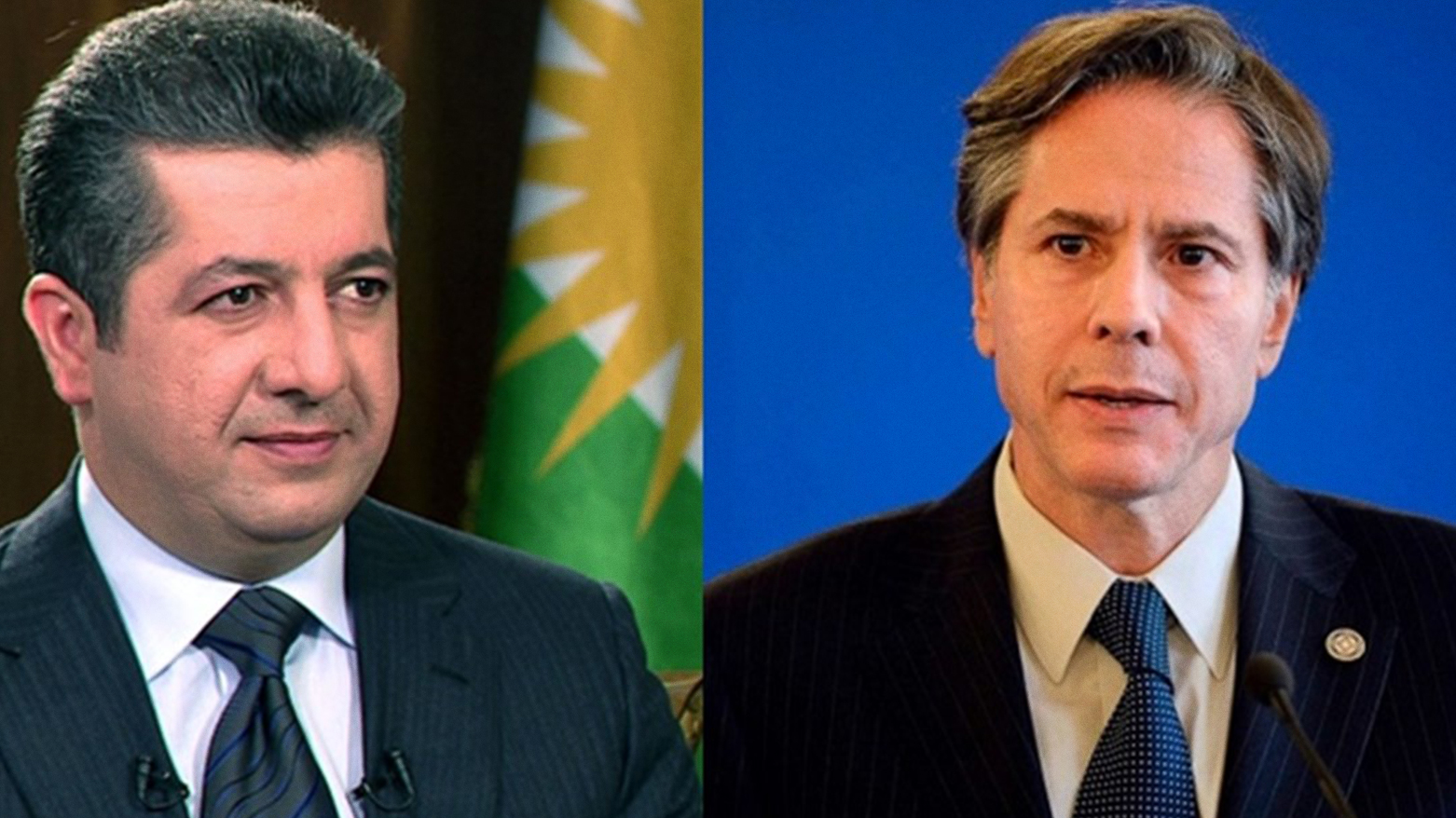KRG Prime Minister Meets with U.S. Secretary of State
KRG Prime Minister Meets with U.S. Secretary of State

WASHINGTON DC, United States (Kurdistan 24) – Masrour Barzani, Prime Minister of the Kurdistan Region, arrived in Washington over the weekend, and one of his first scheduled meetings is with Secretary of State Antony Blinken on Monday morning.
That will be followed by a second meeting at the State Department with Uzra Zeya, Under Secretary for Civilian Security, Democracy, and Human Rights.
This is Barzani’s first official visit to Washington, since he became prime minister in June 2019, although he has visited the U.S. previously in other capacities.
According to a statement from Barzani’s office, he will meet with senior officials at the White House and the U.S. Congress, in addition to Monday’s meetings at the State Department.
“The primary focus of these meetings will be to discuss policy issue of mutual significance and to strengthen bilateral relations between the Kurdistan Region and the United States,” the statement from the prime minister’s office stated, adding that Barzani would “address pertinent developments in Iraq, the Kurdistan Region, and the wider Middle East.”
Middle East Turmoil
Barzani’s visit comes amid widespread turmoil in the Middle East, precipitated by Hamas’s bloody Oct. 7 assault on Israel and the ensuing war in Gaza, which has now lasted nearly five months.
As Washington’s highly-regarded Institute for the Study of War has summarized the situation: “Iran and its so-called ‘Axis of Resistance’ are exploiting the Israel-Hamas war to support their objective of expelling U.S. forces from the Middle East.”
In Iraq and Syria, the Iranian-backed effort to expel the U.S. has focused on attacks on military bases hosting U.S. forces. There were over 170 such attacks, carried out by Iranian-backed militias, until an attack on Jan. 28 killed three U.S. soldiers in northeast Jordan.
That seemed to galvanize the Biden administration. Until then,it had settled for “tit-for-tat” responses to the militia attacks, and they continued. But the deaths of the three soldiers prompted more serious U.S. retaliation, and there have been no such attacks since Feb. 4.
Read More: U.S. Reiterates Continued Commitment to Fighting ISIS in Iraq, Syria
But there is a third Iranian-backed group which is using the Gaza war as an excuse to attack Western interests: Yemen’s Houthis are assaulting international shipping in the Gulf of Aden and the Red Sea.
Following a series of escalating assaults, on Saturday, the U.S. and U.K. conducted a major retaliatory strike against the Houthis, attacking 18 targets in eight locations.
Read More: U.S.-led Coalition Conducts Retaliatory Strikes, as Houthis Win Domestic Support by Attacks
It remains to be seen now whether the latest U.S.-U.K. strikes will have any enduring impact in deterring Houthi attacks.
Iranian Pressure Against the KRG: through Iraq’s Federal Supreme Court
In early 2022, the head of Iran’s Islamic Revolutionary Guard Corps (IRGC), Esmail Qaani, succeeded in gaining significant influence over Iraq’s Federal Supreme Court, as Michael Knights, a senior fellow at The Washington Institute for Near East Policy, explained in a remarkable analysis of Iraq’s political scene (published in both English and Arabic.)
Knights described what he called a “judicial coup,” which was “achieved by gaining control over the supposedly independent Federal Supreme Court” and which “saw one arm of Iraq’s government subordinated to a foreign power.”
Read More: Hoshyar Zebari: Iraq is in crisis and the US must be more engaged
That court has increased its interference in the affairs of the Kurdistan Region, postponing parliamentary elections, as it did with a ruling issued last week.
Read More: U.S. Calls for Holding Kurdish Elections ‘At Earliest Opportunity’
The court also invalidated a longstanding section of the Kurdistan Region’s election law that ensured minority representation in parliament. The mandated change will, most likely, deny Christian representation in the legislative body.
Read More: Kurdistan Region Christians denounce Iraqi federal Supreme Court’s ruling
The Court’s decisions seem contrary to the principle of federalism that is the basis of Iraq’s post-Saddam constitution. One can only speculate on the court’s motives, but, quite possibly, there is an intent, coming from Tehran, to undermine the Kurdistan Region and its stability.
Previous Visits
On one level, Masrour Barzani has long experience in Washington. As a young man, he was a student at American University in Washington DC, where he earned a bachelor’s degree in international studies.
He last visited Washington in 2018, when he was Chancellor of the Kurdistan Region Security Council (KRSC.) In that capacity, he met with the Under Secretary of Defense for Policy, among others.
Read More: Masrour Barzani meets senior Pentagon official
In May 2015, as head of the KRSC, he was part of a senior Kurdish delegation, led by President Masoud Barzani. They met with President Barack Obama and Vice-President Joe Biden, among others. The main issue was the fight against ISIS, and the Kurdish Peshmerga were playing a particularly important role, as Iraqi forces in the north had collapsed in the face of ISIS’s assault, as the terrorist group crossed from Syria into Iraq and seized one-third of the country.